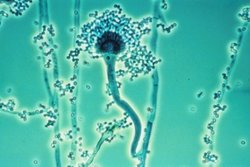
Invasive aspergillosis (IA) is a common and life-threatening infection among bone marrow transplant patients caused by the fungus Aspergillus fumigatus.
About 10% of bone marrow transplant recipients are affected by IA. An estimated 30% of those affected die within three months.
In June, researchers showed that a genetic variant in bone marrow recipients could increase their risk of developing IA almost six-fold. New research published online today in the New England Journal of Medicine shows that genetic variants in the bone marrow donor may also increase the risk of this potentially deadly infection.
Variants Identified
Pierre-Yves Bochud and colleagues from the Fred Hutchinson Cancer Research Center and the University of Washington School of Medicine suggest that identifying IA-associated genetic variants in bone marrow donors could help doctors develop more effective prevention strategies for at-risk recipients.
Using a sample of 242 bone marrow transplant donor/recipient pairs, the researchers found that each a certain variant in a bone marrow donor increased the risk the recipient would develop IA more than four times compared to donors with two Cs.
A follow up study of 366 donors/recipients showed that this effect was seen only when the donors and recipients were unrelated. When a patient received a transplant from a relative, that variant had no effect on the risk of IA. The researchers suggest that recipients of familial donations may require lower amounts of immunosuppressive drugs, thus decreasing their risk of all types of infections.



